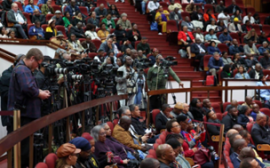
The first National Convention of the National Dialogue took place over two days of vibrant discussion, with over 1 000 delegates from over 200 organisations at the University of South Africa (Unisa) in Tshwane.
The National Convention was convened by President Cyril Ramaphosa as the launch of the National Dialogue to engage all South Africans in a countrywide engagement on the challenges facing the country, and accelerated actions to forge a new vision and to agree on a programme of action to take the country forward.
The National Convention was described by President Ramaphosa as the moment at which
the people of South Africa take over the National Dialogue and ensure that it is led and driven by citizens.“Delegates were resounding in their endorsement of an inclusive National Dialogue process that focuses on the issues that concern the people. For the National Dialogue to be successful, delegates affirmed that it needs to include communities who are often not heard and those who are often not consulted on important decisions.
“One of the noteworthy features of the dialogue was the wide diversity of the delegates. The Convention brought together people and groups who would ordinarily not be in conversation with one another. This added to the robust nature of the discussions,” the Convention Organising Committee said on Sunday.
Over Friday and Saturday, delegates engaged in robust discussion, putting forward their hopes, aspirations, fears and frustrations. The conversation was open and rigorous. It emphasised the need for deep, genuine dialogue that leads to action, where people have power.
Delegates were able to outline key themes for discussion. These included the economy, jobs, children, livelihoods, crime and corruption, education, health and gender-based violence and femicide. Other themes included fixing the State and the Constitution, building South African values and culture, strengthening our social fabric, and dealing with intergenerational trauma and healing.
The Convention agreed that these themes should be seen as a guide to discussion, but that it would ultimately be up to citizens to raise any issues that are important to them.
The Convention also reflected on the draft roadmap towards a citizen-led dialogue, outlining a six to nine-month dialogue proposes of thousands of engagements led by communities, with a mandate to call for radical change, catalyse rapid response to the most urgent challenges, and to make renewed efforts to rebuild and heal the nation.
The Convention called for diverse methods of dialogue, crafted in communities using local knowledge and expertise. Delegates said it was important that all those who participate in the National Dialogue should have the space and opportunity to use the approaches that best suit them and their specific conditions.
Establishing the Steering Committee
The Convention discussed the process for establishing a representative Steering Committee that would take over the work of directing and coordinating the National Dialogue process.
The meeting confirmed that the process to establish a Steering Committee should be extended by two weeks. The 22 sectors that were initially identified were expanded to accommodate more diversity.
Each of the sectors held discussions on how they would select their nominee for the Steering Committee and agreed that they would provide the names of their nominees by the end of August 2025.
To ensure nobody is left behind, this period will provide space to include organisations in sectors who did not attend the National Convention.
“The first National Convention was citizen-led, iterative in nature, with robust engagement. It reflected the complexity of our nation. It was a call for a new era of citizen activism for radical change, rapid response and it was a call to rebuild the nation,” the Convention Organising Committee said. – SAnews.gov.za
No comments:
Post a Comment